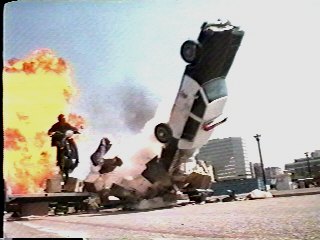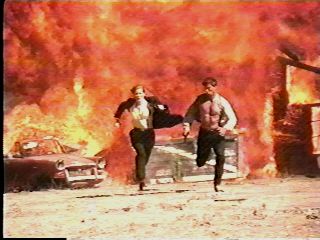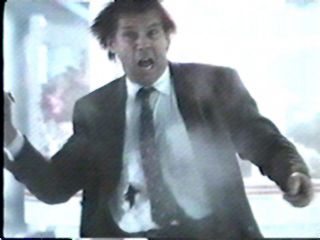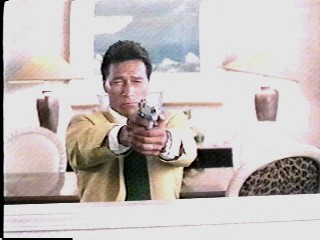
|
|
|
|
|
|
|
|
|
|
|
|
|
(1995) Director: Joseph
Merhi
What's the matter with you people, anyway? I've taught and retaught you over and over, yet you still don't get it. Way back, I told you all about Executive Target, and what did you do? Nothing. Some time later, I then went into further detail when I reviewed The Silencers, and I thought that would do it. Instead, you just yawned. I tried once again when I did Epicenter. Then with The Underground. Cripes, I even put up some pretty pictures from both those movies for you to look at. But all I pretty much got in return was a ho-hum. Not that long ago, I decided to go all-out when I finally managed to get a copy of The Sweeper. I not only wrote my longest review on the subject to date, but I made sure the pictures showed juicy stuff like big explosions and people being burned alive while jumping out of windows several stories above street level. Yet as I surf the Internet, I don't see any of you on various film forums writing in ecstasy on what I taught you, setting up fan web sites on the same thing, or organizing online petitions for DVD editions. I am, if you haven't guessed already (and probably not, seeing how slow you have been to catch on), talking about the movies produced by those demigods Richard Pepin and Joseph Merhi, when they were together and running their company PM Entertainment. After all I've written about the subject, don't you yet realize how good their movies were? That is, if you exclude certain movies like Dance Or Die... or The Sender... or Chance... or Road Ends... or Shotgun... or the legendary Anna Nicole Smith-starring Skyscraper... or... Okay, PM Entertainment certainly put out its share of
duds. But whenever they got it right, they achieved levels of
entertainment that other B-movie Within the first few minutes, Last Man Standing had raised me out of my stupor. Hey, I thought, that opening sequence wasn't bad at all. I continued to watch, paying more attention this time. The next scene played out - at the end of it, all I could think was wow, that was cool. By this point I was getting pretty revved up, though cautiously so because there was a nagging doubt in my mind trying to convince me that soon it would seriously stumble and transform back to the PM sludge I was familiar with. Yet with each subsequent scene, my defenses were hammered down further, and before the end I was completely won over. So won over, that subsequently it must have been a bewildering sight for those video store owners to see this wild-eyed foreigner digging through their stock to see if they had any more PM movies. Well, who wouldn't be won over by a movie that seems to have all the essential ingredients a great action movie should have - great production values, a plot simple-minded enough that you don't have to think much yet doesn't overly insult your intelligence, and oodles of over-the-top action sequences. It's a real ode to joy; in fact, while watching all the carnage happening, I can picture PM honcho and film director Joseph Merhi (who also wrote the screenplay) just out of camera range with baton in hand, conducting fiercely while his long hair is flapping in the air from his intense movements. (Please, no one spoil my dead-set mental image by writing in to inform me Merhi is bald or has hair of normal length.) Merhi is a master of the cinematic art form, knowing not
only how a story should Those two cops, by the way, are partners Kurt Bellmore (Wincott, Martial Outlaw) and "Doc" Kane (Jonathan Banks, Dark Blue). They immediately charge in with guns ablazing, and what follows consists of not just an intense gun battle with leaping around and big splattery gun wounds (of the gory kind), but Kurt getting into a wild foot chase with Snake all over the hotel, leading to a corker of a climatic stunt, though being sure beforehand to break plenty of glass along the way. Kurt takes Snake into custody, but unknown to him, fellow cop Seagrove (Eastin, Catch Me If You Can) is a corrupt bastard who is in cahoots with Snake, and he uses his position to get Snake released on bail. Kurt senses something is up with Seagrove when he discovers most of the money seen in the hotel room disappeared on its way to the evidence room, but Doc tells him to "let it go". Of course, Kurt soon finds himself in a position where he can't let it go. How or why doesn't matter; all that matters is if whatever happens is an excuse for bringing more berserk action and violence into the movie, and I can assuredly tell you that is what indeed happens. The highlight of this mayhem is a central action sequence that combines a security van with things like kicks to the groin, wheelies, cop cars spinning in the air, shotguns, fist-fighting, and explosions - much of which happens while driving down a freeway in the wrong lane. You might think all this stuff couldn't possibly come together, but Merhi shows not only how it very well could happen, but that these things can be very exciting when seen in the right way. Though none of the other action sequences could possibly
match the insatiable insanity One curious thing about Last Man Standing is that despite it starring Jeff Wincott - who has proved his martial art skills in the past with movies like Martial Outlaw - there actually isn't that much martial arts activity to be found in it. At least the little there is of it is done well and shows Wincott's talent at is, which is more than you can say about his acting. As in Martial Outlaw, Wincott is unbelievably stiff in his performance, with his body becoming just as rigid as his facial expression every time he has to say a line of dialogue. The best I can say about his performance is that his awkward and reluctant pronunciation of statements like, "You're dead! You're dead, motherf**ker!" provide some hearty unintended laughs. This may explain why Merhi ended up only writing a limited amount of dialogue for Wincott to speak, and punching up other aspects in the script. It actually results in some nice moments you usually don't see in movies like this. Kurt's wife (Jillian McWhirter, The Underground) is a woman deeply in love with her husband, so much so that it leads to one of the movie's most memorable non-action scenes, an emotion-filled deep confession she makes to Kurt. The writing here (and McWhirter's quite good delivery) makes it believable when she refuses to leave his side when things start getting deadly - and she overcomes her fears to show her worth. While I'm still on the subject of the script, I'd like
to point out that Last Man Standing, like many other PM
movies, has a subtle political agenda. The movie While Merhi's refusal to discuss any plausible solutions to any flaws in the American legal system can't really be considered a problem - after all, the main intent of this particular movie is to entertain and not make us think - there are some other questions his screenplay brings up that really did need to be answered, namely with some plot points. For instance, early on in the movie, there is another policeman character who seems to have some kind of connection with Kurt's wife, though at the time it's not explained. Later, it's revealed this character is her brother, and in the scene where this fact is revealed it's suggested that he's going to end up playing some major role in the crisis. But he's never seen in the movie again. Was it like this in the original screenplay, or was this subplot dropped in the final edit? I can't be sure, but I suspect the latter, especially since some other plot turns play out with a remarkable abruptness and lack of explanation. But as I said just a few sentences ago, this movie was meant more to entertain that to get us to think. I mean, look: Car crashes! Kung fu! Explosions! People not only dying, but violently! Don't you get it?!? Don't you get it?!? Don't you get that there's a whole world of entertainment just waiting for you at your neighborhood video stores? (At least those that still carry VHS.) Don't you now get it that PM movies like Last Man Standing are what make life worth living? Somehow, I don't think you've managed to get it by now. Well, I still have at least one more chance to reteach you, seeing how I still have to review Rage.
Check for availability on Amazon (VHS) See also: Executive Target, The Silencers, The Sweeper |
 companies seldom if ever match. And they got it
right enough times to leave behind a body of work that makes me utterly
perplexed as to why B-movie fans seem largely ignorant of PM and its
films. The only possible reason I can think of is that they happened to
watch one or two of PM's lesser efforts, and decided from what they saw
that a further look at the company's wares would not be worth their
time and money. In fact, that's how the situation was with me after my
first encounters with PM movies. After a few clunkers like Final
Impact ("Kickboxing with heart and soul!" claimed a reviewer on
the cover of the box - yeah, right!), I swore off PM movies, and it was
only because I couldn't read Korean that I finally saw how good they
could be. Let me explain that in detail; several years ago I was
teaching English in Korea, and during my off-hours I would often rent
movies from the various (and surprisingly numerous) video stores in my
neighborhood. I would choose movies from the pictures and limited
English on the boxes. Not being able to read the fine print, so to say,
one day I accidentally picked up a PM movie - the very one I'm
reviewing this week, as a matter of fact. When I got home and started
up the video, I groaned out loud upon seeing the PM logo. But since my
money was already gone, I settled back grudgingly.
companies seldom if ever match. And they got it
right enough times to leave behind a body of work that makes me utterly
perplexed as to why B-movie fans seem largely ignorant of PM and its
films. The only possible reason I can think of is that they happened to
watch one or two of PM's lesser efforts, and decided from what they saw
that a further look at the company's wares would not be worth their
time and money. In fact, that's how the situation was with me after my
first encounters with PM movies. After a few clunkers like Final
Impact ("Kickboxing with heart and soul!" claimed a reviewer on
the cover of the box - yeah, right!), I swore off PM movies, and it was
only because I couldn't read Korean that I finally saw how good they
could be. Let me explain that in detail; several years ago I was
teaching English in Korea, and during my off-hours I would often rent
movies from the various (and surprisingly numerous) video stores in my
neighborhood. I would choose movies from the pictures and limited
English on the boxes. Not being able to read the fine print, so to say,
one day I accidentally picked up a PM movie - the very one I'm
reviewing this week, as a matter of fact. When I got home and started
up the video, I groaned out loud upon seeing the PM logo. But since my
money was already gone, I settled back grudgingly.  be told but what should be in it.
For example, he knows that one of the greatest ways to open a movie
should be with a bank robbery. Oh, quit your whining about how clichéd
and tiresome it is for a movie's first scene to have such an incident;
after all, I mentioned in the opening of this paragraph that it's
important how something is done in a movie. Merhi shows how
such a scene should be done; for example, having the robbers swing
shotguns and metal rods into the faces of people with the ferocity of
baseball bats. And having them earlier planted bombs along their escape
route so that pursuing cop cars will end up rolling around with as much
ferocity as those weapons, or propel the cop cars into innocent
civilian vehicles with enough force so that both cars end up exploding.
Naturally, the robbery should be headed by a guy who just oozes
evil, relishing all the criminal activity he commits. Merhi correctly
provides such a character, a slimy thug by the name of Snake Underwood
(Jonathan Fuller, Skyscraper), who proves to be an
especially skilled criminal. He's so efficient, that when he orders one
of his underlings to machine-gun a greedy member of his gang after the
robbery, it's done at a time so the same bullets passing through the
guy can zip out the door and blow away the hotel's desk clerk, outside
the door preparing to open it for the two cops he called in earlier.
be told but what should be in it.
For example, he knows that one of the greatest ways to open a movie
should be with a bank robbery. Oh, quit your whining about how clichéd
and tiresome it is for a movie's first scene to have such an incident;
after all, I mentioned in the opening of this paragraph that it's
important how something is done in a movie. Merhi shows how
such a scene should be done; for example, having the robbers swing
shotguns and metal rods into the faces of people with the ferocity of
baseball bats. And having them earlier planted bombs along their escape
route so that pursuing cop cars will end up rolling around with as much
ferocity as those weapons, or propel the cop cars into innocent
civilian vehicles with enough force so that both cars end up exploding.
Naturally, the robbery should be headed by a guy who just oozes
evil, relishing all the criminal activity he commits. Merhi correctly
provides such a character, a slimy thug by the name of Snake Underwood
(Jonathan Fuller, Skyscraper), who proves to be an
especially skilled criminal. He's so efficient, that when he orders one
of his underlings to machine-gun a greedy member of his gang after the
robbery, it's done at a time so the same bullets passing through the
guy can zip out the door and blow away the hotel's desk clerk, outside
the door preparing to open it for the two cops he called in earlier. of that
one, they are all still very well done. One asset that they all share
is that they are staged with exceeding professionalism. It's no
surprise that like other PM movies, the cinematography here is
outstanding, with the almost-glowing colors giving the movie a very
expensive look. Another asset is that Merhi was able to stage many of
the action scenes in extremely eye-catching and expensive-looking
locations instead of relying on generic alleys or warehouses. The hotel
sequence, for instance, was filmed at the grand Hyatt Regency in Long
Beach, and the action goes all over the various sections inside. Actual
banks were used for the robbery sequences, and the climax takes place
in the Los Angeles subway system. Of course, what really makes these
action sequences work is... well, all the action in them. Though, of
course, it's not enough to have hundreds of bullets get fired, get
dozens of people killed, or wreck a good amount of cars, even if the
cars are, for a change, expensive ones like Corvettes. Merhi is smart
enough to keep the action swift and intense, not letting up until
there's a definite finish. Some bad editing does come up during the
chemical plant sequence that makes it difficult to figure out just what
is going on and where it is going on in the facility, but the various
instances with Wincott going from thug to thug in order to break and
crush their bones somehow fills in any such glaring gaps in the
narrative.
of that
one, they are all still very well done. One asset that they all share
is that they are staged with exceeding professionalism. It's no
surprise that like other PM movies, the cinematography here is
outstanding, with the almost-glowing colors giving the movie a very
expensive look. Another asset is that Merhi was able to stage many of
the action scenes in extremely eye-catching and expensive-looking
locations instead of relying on generic alleys or warehouses. The hotel
sequence, for instance, was filmed at the grand Hyatt Regency in Long
Beach, and the action goes all over the various sections inside. Actual
banks were used for the robbery sequences, and the climax takes place
in the Los Angeles subway system. Of course, what really makes these
action sequences work is... well, all the action in them. Though, of
course, it's not enough to have hundreds of bullets get fired, get
dozens of people killed, or wreck a good amount of cars, even if the
cars are, for a change, expensive ones like Corvettes. Merhi is smart
enough to keep the action swift and intense, not letting up until
there's a definite finish. Some bad editing does come up during the
chemical plant sequence that makes it difficult to figure out just what
is going on and where it is going on in the facility, but the various
instances with Wincott going from thug to thug in order to break and
crush their bones somehow fills in any such glaring gaps in the
narrative. has an extremely
cynical viewpoint of the justice system. Few people in the system are
shown to be trustworthy. Corruption is shown not only to be rampant,
but even tolerated to a great extent. There's no real safety line with
the Internal Affairs bureaus; they are seen as somewhat of a joke,
coming across as pretty powerless unless you have absolute proof. Even
the criminal element is shown to have a cynical view of the process. At
one point, Merhi loses all efforts at being subtle and goes into a
rant, resulting in one criminal sneering at one point, "Have you
watched much TV lately? There's this guy, he butchered his wife and her
lover, and he's a hero! A couple of rich kids, they shot both their
parents dead. And they're heroes! All I did was rob a few banks. Man,
you can't send me to jail. I mean, wake up, man, this is America! No
one goes to jail if you've got the right lawyer." Though Merhi may make
some valid points in his agenda, he doesn't seem to provide any real
answers to these kind of problems, except maybe that mocking criminals
should be promptly kneed in the groin, as this fellow is.
has an extremely
cynical viewpoint of the justice system. Few people in the system are
shown to be trustworthy. Corruption is shown not only to be rampant,
but even tolerated to a great extent. There's no real safety line with
the Internal Affairs bureaus; they are seen as somewhat of a joke,
coming across as pretty powerless unless you have absolute proof. Even
the criminal element is shown to have a cynical view of the process. At
one point, Merhi loses all efforts at being subtle and goes into a
rant, resulting in one criminal sneering at one point, "Have you
watched much TV lately? There's this guy, he butchered his wife and her
lover, and he's a hero! A couple of rich kids, they shot both their
parents dead. And they're heroes! All I did was rob a few banks. Man,
you can't send me to jail. I mean, wake up, man, this is America! No
one goes to jail if you've got the right lawyer." Though Merhi may make
some valid points in his agenda, he doesn't seem to provide any real
answers to these kind of problems, except maybe that mocking criminals
should be promptly kneed in the groin, as this fellow is.